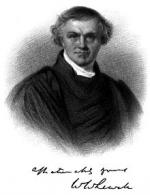Disable ads!
William Whewell
William Whewell FRS FGS (/ˈhjuːəl/ HEW-əl; 24 May 1794 – 6 March 1866) was an English polymath, scientist, Anglican priest, philosopher, theologian, and historian of science. He was Master of Trinity College, Cambridge. In his time as a student there, he achieved distinction in both poetry and mathematics. What is most often remarked about Whewell is the breadth of his endeavours. At a time when men of science were becoming increasingly specialised, Whewell appears as a vestige of an earlier era when men of science dabbled in a bit of everything. He researched ocean tides (for which he won the Royal Medal), published work in the disciplines of mechanics, physics, geology, astronomy, and economics, while also finding the time to compose poetry, author a Bridgewater Treatise, translate the works of Goethe, and write sermons and theological tracts. In mathematics, Whewell introduced what is now called the Whewell equation, an equation defining the shape of a curve without reference to an arbitrarily chosen coordinate system. One of Whewell's greatest gifts to science was his wordsmithing. He often corresponded with many in his field and helped them come up with new terms for their discoveries. Whewell contributed the terms scientist, physicist, consilience, catastrophism, and uniformitarianism, amongst others; Whewell suggested the terms ion, dielectric, anode, and cathode to Michael Faraday. Whewell died in Cambridge in 1866 as a result of a fall from his horse.
 Read more on wikipedia.org Read more on wikipedia.org
 All quotes by William Whewell All quotes by William Whewell
 Edit Edit
|

|
|
|
|
|
Background photo by Giuliana
|